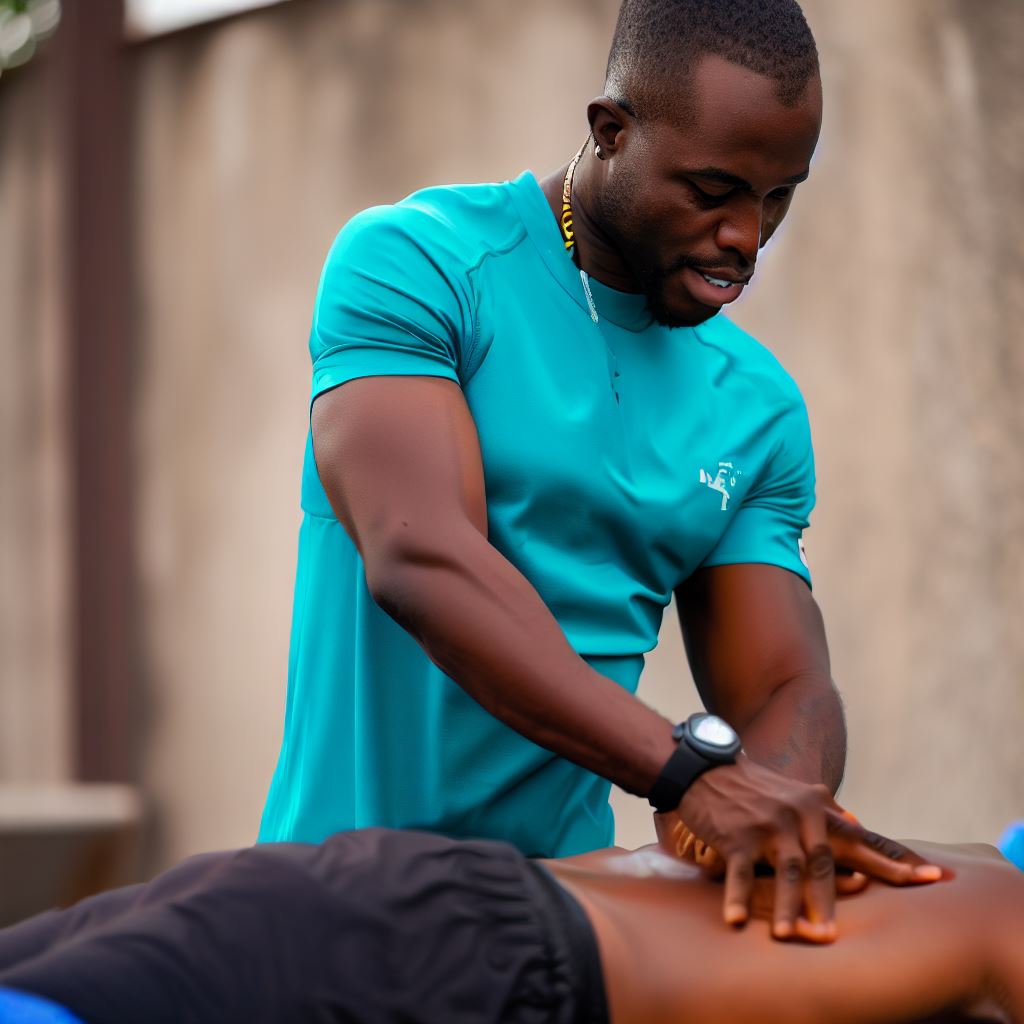Introduction
Legal regulations for sports massage therapists are essential to uphold professional standards and protect clients.
Sports massage therapy is an increasingly sought-after treatment in Nigeria, proving its effectiveness in enhancing athletic performance and promoting overall well-being.
The demand for skilled sports massage therapists has grown, leading to the need for proper legal regulations to ensure the safety and quality of these services.
Legal regulations for sports massage therapists in Nigeria hold great importance for various reasons.
Firstly, they provide a framework that defines the scope of practice and establishes professional standards.
This ensures that only qualified individuals with appropriate training and expertise can offer sports massage therapy services.
Furthermore, legal regulations help monitor and control the quality of services provided by sports massage therapists.
By obtaining proper licensure and adhering to specific guidelines, therapists can guarantee the safety and well-being of their clients.
This not only protects the public from potential harm but also maintains the reputation and credibility of the profession.
Legal regulations also promote accountability and ethical conduct among sports massage therapists.
They outline the obligations and responsibilities of therapists, including obtaining informed consent, maintaining client confidentiality, and following appropriate hygiene practices.
Compliance with these regulations fosters trust and confidence between therapists and their clients, leading to a positive therapeutic relationship.
Basically, the legal regulations for sports massage therapists in Nigeria play a vital role in providing a standardized framework for practice.
By upholding professional standards, ensuring client safety, and promoting ethical conduct, these regulations contribute to the growth and recognition of sports massage therapy as a legitimate healthcare profession in the country.
Current State of Sports Massage Therapy in Nigeria
Lack of specific regulations for sports massage therapists
- In Nigeria, sports massage therapy lacks specific regulations and guidelines.
- This absence of regulations makes it challenging for sports massage therapists to practice legally.
- Without specific regulations, there is a lack of clarity in terms of scope of practice and professional standards.
- The absence of regulations also hinders the development of sports massage therapy as a recognized profession in Nigeria.
- Sports massage therapists face difficulties in gaining recognition and respect due to the absence of specific regulations.
Existence of general regulations for massage therapy
- While there are general regulations for massage therapy in Nigeria, they do not cater specifically to sports massage therapists.
- These general regulations apply to all types of massage therapy practices, including relaxation and therapeutic massage.
- The lack of specific regulations for sports massage therapy poses challenges for therapists specializing in this field.
- General regulations fail to address the unique needs and requirements of sports massage therapy.
- Sports massage therapists often have to adapt and modify their practices to comply with the general regulations.
Challenges faced by sports massage therapists due to inadequate regulations
- The absence of specific regulations undermines the credibility and professionalism of sports massage therapy in Nigeria.
- Sports massage therapists face difficulties in differentiating themselves from untrained or uncertified individuals practicing massage.
- The lack of regulations allows for unqualified individuals to offer sports massage services, putting athletes at risk.
- Inadequate regulations hinder the proper assessment, treatment, and rehabilitation of athletes through sports massage therapy.
- Without regulations, insurance coverage and reimbursement for sports massage therapy services may be limited or non-existent.
Generally, the current state of sports massage therapy in Nigeria is characterized by a lack of specific regulations.
This absence poses challenges for therapists, including difficulties in practicing legally, gaining recognition, and ensuring professionalism.
The general regulations for massage therapy in the country fail to cater specifically to the unique needs and requirements of sports massage therapists.
As a result, the credibility and development of sports massage therapy as a recognized profession in Nigeria are hindered.
Adequate regulations are necessary to ensure the safety of athletes, promote professionalism, and provide a framework for the practice of sports massage therapy in the country.
Read: Understanding the Role of a Sports Massage Therapist in Nigeria
Benefits of Legal Regulations for Sports Massage Therapists
Legal regulations play a crucial role in protecting both clients and sports massage therapists in Nigeria.
By enforcing specific laws and guidelines, they ensure the safety and welfare of clients, maintain professional standards and ethics, and enhance the credibility and reputation of sports massage therapy.
Ensuring the safety and welfare of clients
One of the primary benefits of legal regulations is ensuring the safety and welfare of clients receiving sports massage therapy.
With established guidelines, therapists are held accountable for providing quality care and preventing any potential harm.
These regulations often include requirements for proper training, certifications, and continued education for therapists to stay updated with the latest techniques and practices.
They may also involve protocols for hygiene, sanitation, and the use of proper equipment to prevent infections and injuries during massage sessions.
By prioritizing client safety, legal regulations help build trust between therapists and their clients, creating a positive and secure environment for receiving sports massage therapy.
Maintaining professional standards and ethics
Legal regulations set forth professional standards and ethics that sports massage therapists must adhere to.
This ensures that therapists conduct themselves with integrity and professionalism while delivering their services.
These regulations typically encompass guidelines governing therapist-client relationships, confidentiality, privacy, and the appropriate boundaries of touch.
By maintaining these standards, therapists are better equipped to establish a sense of trust and respect with their clients.
In addition, legal regulations may require therapists to maintain proper documentation, such as client records and informed consent forms.
This helps in establishing accountability and professionalism within the field, ensuring that therapists act responsibly and ethically.
Enhancing the credibility and reputation of sports massage therapy
Legal regulations play a vital role in enhancing the credibility and reputation of sports massage therapy as a legitimate and recognized profession.
By imposing certain requirements and standards, these regulations establish sports massage therapy as a reputable branch of healthcare.
When clients are aware that therapists must meet specific qualifications and adhere to regulations, it instills confidence in the therapy and the professionalism of the practitioners.
This, in turn, contributes to an improved reputation for sports massage therapy as a beneficial and reliable form of treatment.
Furthermore, legal regulations may also include provisions for the accreditation and licensing of sports massage therapists.
This adds another layer of credibility by ensuring that only qualified and competent individuals are allowed to practice.
It helps protect the public from untrained or unscrupulous practitioners, increasing the trust and respect for the profession.
Essentially, legal regulations for sports massage therapists in Nigeria offer numerous benefits.
They prioritize the safety and welfare of clients, maintain high professional standards and ethics, and enhance the credibility of sports massage therapy as a respected profession.
By complying with these regulations, therapists can provide quality care and foster trust with their clients, supporting the growth and development of the field.
Read: Education Required for Sports Massage Therapists in Nigeria
Comparison with International Standards and Regulations
Overview of Regulations in Other Countries for Sports Massage Therapists
- United States: In the U.S., sports massage therapists must meet specific licensing requirements set by each state.
- United Kingdom: The UK has a professional association called the Sports Massage Association, which sets standards for training and practice.
- Australia: Sports massage therapists in Australia must obtain a Certificate IV in Massage Therapy Practice to practice legally.
- Canada: Different provinces in Canada have their own regulations for sports massage therapists, including certification and licensing requirements.
- Germany: Sports massage therapists in Germany must complete a recognized training program and register with the local health authorities.
Highlighting the Need for Similar Regulations in Nigeria
- Professionalism and Quality Assurance: Implementing regulations for sports massage therapists in Nigeria would ensure a high standard of practice and protect the public from unqualified practitioners.
- Safety and Health: Regulations would promote the safety and well-being of athletes by ensuring therapists have the necessary knowledge and skills to prevent and address injuries.
- International Recognition: Aligning Nigerian regulations with international standards would enhance the credibility and reputation of Nigerian sports massage therapists.
- Career Development and Opportunities: A regulated profession would provide therapists with clear career pathways, continuing education options, and potential employment in international sports events.
- Consumer Confidence: Regulations would build trust and confidence among athletes and clients, as they would have assurance that the therapist’s qualifications meet recognized standards.
- Protection Against Malpractice: Regulatory guidelines would enable individuals to seek legal recourse in case of negligence or malpractice by sports massage therapists.
- Collaboration and Networking: Implementing regulations would foster collaboration among professionals, both nationally and internationally, leading to knowledge sharing and skill development.
Essentially, comparing Nigerian regulations for sports massage therapists with international standards highlights the need for similar regulations in Nigeria.
By doing so, Nigeria can ensure professionalism, safety, international recognition, and career development opportunities for sports massage therapists.
It would also enhance consumer confidence, protect against malpractice, and foster collaboration among professionals, benefiting both athletes and practitioners in the country.
Read: Sports Massage Therapy in Nigeria: Salaries and Benefits

Proposed legal regulations for sports massage therapists in Nigeria
In order to ensure the safety and effectiveness of sports massage therapy in Nigeria, it is crucial to establish comprehensive legal regulations for practitioners.
These regulations should cover various aspects of the profession, including certification and licensing requirements, educational qualifications and training programs, scope of practice and limitations, as well as a code of conduct and professional ethics.
Certification and licensing requirements
Sports massage therapists in Nigeria should be required to obtain certification and licensing from a recognized regulatory body.
This would ensure that practitioners have met certain standards of education and training, as well as possess the necessary skills and knowledge to provide safe and effective treatment.
The certification and licensing process should involve a thorough examination of the therapist’s qualifications, including their educational background, practical experience, and adherence to ethical standards.
Renewal of certification should be required periodically to ensure ongoing competency.
Educational qualifications and training programs
It is essential that sports massage therapists in Nigeria possess a minimum level of educational qualifications and undergo appropriate training programs.
This would ensure that they have a solid foundation of knowledge and skills related to anatomy, physiology, sports injuries, assessment techniques, and treatment protocols.
The educational qualifications for sports massage therapists should include a minimum level of formal education, such as a diploma or degree in sports massage therapy or a related field.
Training programs should be accredited by the regulatory body and should include both theoretical and practical components.
Scope of practice and limitations
Clear guidelines should be established regarding the scope of practice for sports massage therapists in Nigeria.
This would define the specific techniques, treatments, and conditions that therapists are allowed to address in their practice.
The scope of practice should also include limitations, ensuring that therapists do not engage in activities outside of their expertise and training.
Referral mechanisms should be in place for cases that require additional medical or specialized intervention.
Code of conduct and professional ethics
A code of conduct and professional ethics should be developed for sports massage therapists in Nigeria.
This would outline the expected behavior and responsibilities of therapists towards their clients, colleagues, and the profession as a whole.
The code of conduct should include guidelines on confidentiality, informed consent, professional boundaries, and ethical advertising and marketing practices.
It should also address issues of integrity, professionalism, and continuous professional development.
In general, the establishment of comprehensive legal regulations for sports massage therapists in Nigeria is vital for the development and standardization of the profession.
Certification and licensing requirements, educational qualifications and training programs, scope of practice and limitations, as well as a code of conduct and professional ethics, are essential components of these regulations.
Read: Becoming a Sports Massage Therapist in Nigeria: A Guide
Potential challenges in implementing legal regulations
Resistance from unregulated practitioners
- Unregulated practitioners may oppose legal regulations as it restricts their freedom to practice.
- They may argue that their experience and skills should be enough to ensure safety.
- Resistance may manifest in lobbying against the regulations or challenging them legally.
- Addressing their concerns and including their input in the regulations can help mitigate resistance.
Lack of awareness among the general public and policymakers
- Many people, including policymakers, may not be fully aware of the importance of regulating sports massage therapists.
- They may not understand the potential risks involved and the need for standardized training and qualifications.
- Educational campaigns and outreach programs can help increase awareness and garner support.
- Engaging with policymakers through seminars and workshops can also help in explaining the benefits of regulation.
Potential conflicts with existing regulations for massage therapy
- Legal regulations for sports massage therapists may conflict with existing regulations for general massage therapy.
- Differentiating between the two practices and ensuring consistency in regulations can be challenging.
- Collaboration and coordination between relevant governing bodies can help resolve conflicts and create harmonized regulations.
- Regular review and updating of regulations can ensure they remain relevant and effective.
In essence, implementing legal regulations for sports massage therapists in Nigeria may face several challenges.
Resistance from unregulated practitioners, lack of awareness among the general public and policymakers, and conflicts with existing regulations for massage therapy are some potential obstacles.
However, by addressing these challenges through engagement, education, and coordination, it is possible to create a regulatory framework that ensures the safety and effectiveness of sports massage therapy in Nigeria.
Uncover the Details: Cultural Hair Styles in Nigeria: A Stylist’s Insight
Conclusion
Recap of the Importance of Legal Regulations for Sports Massage Therapists in Nigeria
Legal regulations for sports massage therapists in Nigeria are crucial.
These regulations ensure the safety and quality of sports massage therapy.
They protect athletes from unqualified practitioners.
Regulations also maintain the integrity of the profession, fostering trust between therapists and clients.
Without proper regulations, anyone could claim to be a sports massage therapist, jeopardizing athlete well-being.
Legal frameworks set standards and qualifications.
Moreover, regulations enhance accountability.
Clients have recourse in case of malpractice. This safeguards the reputation of the therapy industry.
Call to Action for Policymakers, Professional Associations, and Practitioners for Implementation of Regulations
Policymakers must prioritize drafting and enacting comprehensive legislation for sports massage therapy.
This safeguards public health and athlete performance.
Professional associations should actively engage in shaping these regulations.
Their expertise ensures that regulations are practical, effective, and industry-relevant.
Practitioners must support these efforts.
They should seek proper certification and actively participate in ongoing training and education.
It’s time to collaborate.
Policymakers, associations, and practitioners must work together to establish and enforce legal regulations for sports massage therapy.
In doing so, we’ll create a safer, more trustworthy environment for athletes and uphold the integrity of this vital profession.




